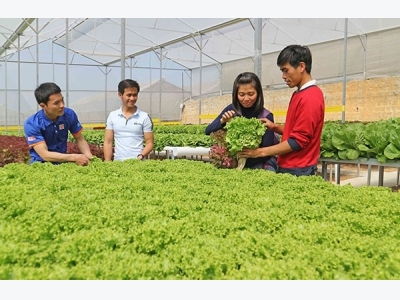Đà Lạt farmer quit job to grow organic vegetables

Lê Quốc Đức (right) introduces the techniques of hydroponic vegetable planting to visitors at his farm in Đà Lạt City. -- Photo baolamdong
LÂM ĐỒNG – Three years ago, Lê Quốc Đức, a 30-year-old man in Đà Lạt City of Lâm Đồng Province, decided to quit his white-collar job at a State-owned company to become a farmer.
With only basic knowledge of gardening, the master-degree holder put all of his efforts into learning how to grow organic vegetables.
By late 2016, he had his own organic vegetable farm. The hydroponic farm located in front of Love Valley in the city’s District 8, has become a tourism hot-spot due to its modernity and cleanliness.
Standing in the middle of his 1,500 square metre farm in heat of nearly 40 degrees Celsius at noon, Đức patiently and carefully catches insects on his lettuces.
“I spend most of my time here, everyday from dawn to dust. Gardening is much harder than working in offices, but I’m satisfied with it,” he said to the Lâm Đồng newspaper.
Several years ago, Đức visited hydroponic vegetable farms, which became popular among farmers in Đà Lạt, and quickly fell in love with the technique.
He learnt the techniques of the planting veggies from local agricultural experts and businesses. What he found interesting about the model was the automated planting process.
Most of the hydroponic process is automatic. Under the model, vegetables, mainly leafy ones, are grown in water pipes. Nutrient-filled water runs through the pipes to the trays slowly to make the roots wet and provide nutrition for the vegetables. Growers only have to pull the vegetables from the pipes and chop off their roots at harvest time
The hydroponic technique, which said no to soil, was special, he said. Farmers could control the nutrients for the plants and make sure that there was no fertiliser or substances in the soil.
Đức said to make a hydroponic farm, a modern green house, water supplying system and pipes and trays below are all necessary.
“I had to run around borrowing money and hire a space to build my farm. I’ve spent more than VNĐ 1 billion ($44,050) on this farm,” he said.
Setting up the farm is just part of the job. In his first harvest, the vegetables grew so quickly that he could not sell them all. Seeing the vegetables rot, Đức learnt that being a good farmer is not enough. Only by working as both a farmers and a trader would he be a success.
Đức spent days wandering around the city and working with local supermarkets and food stores, and promoting his products on social networks. After six months, he could sell between 100 and 300 kilogrammes of vegetables every day for VNĐ40,000 ($1.8) per kilo.
“Investment costs for the farm are quite high, but if consumption is as good as now, I will get the money back within one year,” he said.
To teach more people know about the hydroponic model, Đức decided to open the farm to visitors, and was surprised when the farm received up to 300 visitors per day and even more at weekends. Visitors learn about the hydroponic vegetables, join the planting process and harvest the vegetables.
Đặng Thị Mỹ Duyên, a visitor said that it was her first time learning about the technique. She took many photos and purchased lots of vegetables for her family.
Nguyễn Minh Hoàng, a tour guide from HCM City said the farm was an ideal destination and received positive feedback from tourists as it allows them to go sightseeing and shopping at the same time.
Sharing his future plans, Đức said he would enlarge the farm with new vegetables and local fruits. Strawberries, a speciality of the city, would be planted first.
“If more people know about this model of vegetable cultivation it means more people choose safe and clean vegetables and farming businesses like me can feel secure”, he said.
Có thể bạn quan tâm
 Vietnamese fruit exporters warned about 13 UAE companies
Vietnamese fruit exporters warned about 13 UAE companies Việt Nam’s fruit and vegetable exports to the UAE grew from US$14.2 million in 2014 to $16.2 million in 2015 and $22.8 million in 2016.
 Opportunity to expand the market for Vietnamese vegetables and fruits
Opportunity to expand the market for Vietnamese vegetables and fruits The total value of fruits and vegetables exports of our country has reached 1.02 billion USD, up by nearly 33% over the same period year in 2016.
 Vietnam vows to reorganize coffee production
Vietnam vows to reorganize coffee production With export volume of 1.8 million tons and export turnover of $3.35 billion, coffee was the biggest farm export item in 2016.